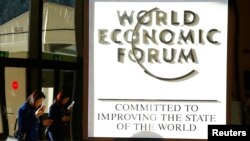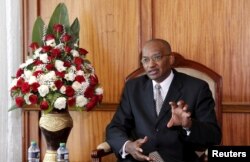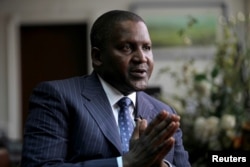In this Swiss Alps town where the global elite have gathered to debate the world's problems, there seems to be little room on the radar for Africa, a continent of over a billion people where a commodity-fueled growth boom has soured with a vengeance.
Sub-Saharan Africa's economies, described a few years ago by consultancy McKinsey as “lions on the move.” likely expanded just 1.6 percent last year according to the World Bank — the slowest rate in two decades and one that lags the continent's galloping population growth.
This week, investors were reminded afresh of Africa's fragile record on democracy and governance — joint African forces are preparing to oust Gambian leader Yahya Jammeh who has refused to step down after losing elections.
And a debt default in once-promising Mozambique could be the first of many across the continent in coming years.
'People are shell-shocked'
These issues seem a world away from the rich slopes of Davos, particularly this year when many political and business leaders are preoccupied with the inauguration of U.S. president-elect Donald Trump on Friday and fractures in Europe.
“I think people are shell-shocked after 2016,” Kenyan central bank governor Patrick Njoroge said in a reference to events such as the Brexit vote and Trump's election victory.
“It is clear we have to deal with lots of issues ourselves ... the UK and U.S. are busy doing their own thing.”
Other forum attendees also acknowledged a change in focus from addressing the problems of the developing world, as Western leaders struggle with popular rage against company bosses, bankers and migration.
“A combination of politics and populism is continuing to take precedence on a worldwide basis compared to Africa,” Robert Moritz, global chairman of consultancy PWC, told the Reuters Global Markets Forum in Davos.
“Africa has a lot of long-term potential but people are questioning how quickly they can realize that potential so they are not spending as much time on that compared to the rest of the world,” Moritz added.
That shift coincides with a lackluster economic picture.
PWC's annual survey released at the summit showed Africa was the only region where company chief executives said they had waning short-term confidence, bucking the robust mood in other
emerging economies. Currency risks, the availability of talent and the possibility of social unrest or corruption were cited as reasons.
Countries on brink
This is exactly why Africa warrants more focus, said Mukhisa Kituyi, secretary general of U.N. trade and development agency UNCTAD.
“There's a lack of Africa-centric issues [at Davos]. It's a big gulf this year," Kituyi told Reuters.
“We are seeing countries which are on the brink of default on debt. If [U.S.] interest rates rise quickly many countries ... will quickly move into insolvency. The knock-on effects will be very substantial”
Contrast
Not too long ago, in around 2010-2014, Davos attendees were captivated by the Africa Rising narrative.
Inspired by buoyant oil and commodity revenues, investors seized on faster economic growth than in the past and compared with the developed world, rising incomes and even peaceful political transitions, as proof of a structural shift.
Now, that optimism has reversed.
Nigeria, Africa's biggest economy, is in recession, and in danger of a currency crisis. The continent's most industrialized economy, South Africa, celebrated for its post-apartheid democratic transformation, is struggling with sluggish growth and political squabbles that could see it lose its investment grade credit rating this year.
Downgrades coming
There have also been outbreaks of violence, even in Ethiopia and Ivory Coast — the African success stories of recent years.
“People like simple stories and the simple story was that commodity prices rose, many African countries did better on the back of that and some people then dressed it up as Africa Rising,” Devan Kaloo, global head of equities at Aberdeen Asset Management, said on the sidelines of the WEF.
Ratings agency Moody's last year cut the credit ratings of a third of the 19 countries it rates in sub-Saharan Africa. It warned this month more downgrades were likely in 2017.
Governments must work harder to lure investment, said Nigerian tycoon Aliko Dangote — Africa's richest man — whose empire straddles several African countries and sectors.
“What we don't like as investors in Africa is that governments say: ‘Come and invest, I will give you tax holidays, I'll give you this and that.’ Dangote told a WEF panel. “But the moment you take the risk, if things turn out well, the government will say: ‘Let me remove this tax holiday.’”
Not all bad
But many of those who rejected the Africa Rising narrative are not convinced Africa is sunk.
“We have gone from everyone thinking it was a fantastic
story to everyone thinking it's a terrible one,” Kaloo said. “[African countries] are slowly changing, ultimately disciplined by the market. They sooner or later will come around to what the market wants because of the cost of capital.”
Recent U.N. data showed that while stock and bond investment into Africa collapsed in 2016, “direct” bricks-and-mortar investment held steady at $82 billion.
The CEO of private equity firm Abraaj told Reuters that Africa was core to its investment plan and he would be keen to buy Barclays' Africa business.
Charles Robertson, global chief economist at Renaissance Capital, compares East African states Rwanda, Kenya, Tanzania, Uganda and Ethiopia to South Korea in 1960, poverty-stricken
before its industrial boom.
Annual growth is running at a solid 5-7 percent in those five countries.
“There are some African countries I'd write off for 15 years,” Robertson said. “There are 9-10 countries that won't go anywhere but the rest are going to advance.”







